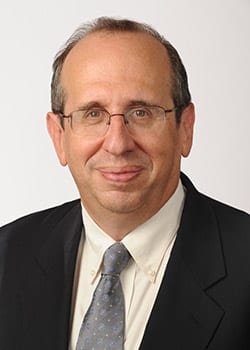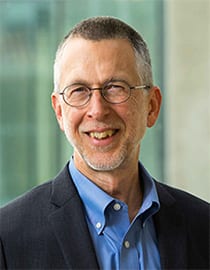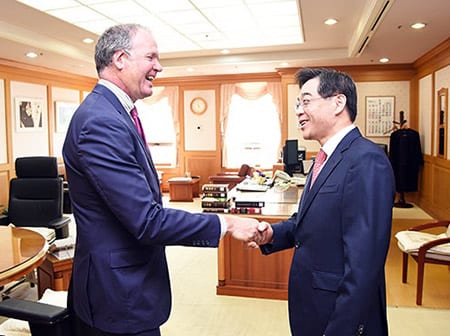By Andrew Cohen

China’s push to create a dynamic economy with innovative companies is creating opportunities for new academic, commercial, and government partnerships. Eager to maximize those opportunities—and to deepen its foothold overseas—Berkeley Law has launched the Asia IP Project.
Powered by the school’s Berkeley Center for Law & Technology (BCLT), the initiative seeks to enhance existing collaborations and develop new ones with academic institutions and other partners in Asia. Center leaders will bring together Chinese and U.S. academics, government officials, and practicing lawyers to better understand Asia’s intellectual property law issues through research, workshops, conferences, and other events.
Mark Cohen, recently senior counsel at the U.S. Patent and Trademark Office (USPTO), will lead the project. Cohen, who joined Berkeley Law November 27, will also teach international trade law, research and write on IP issues, and organize events.
“The long-term goal is to make this sustainable,” Cohen said. “That means having useful and high-quality programs, path-breaking research, and a hub where people want to engage with us on these rapidly evolving issues. I think now is the right time to do this, and that Berkeley is the right place.”
Cohen has more than 30 years of private firm, public sector, in-house, and academic experience in China and transition economies, with a focus on technology trade and intellectual property. Fluent in Mandarin, he has been director of international IP at Microsoft, of counsel at Jones Day’s Beijing office, and senior IP attaché at the U.S. Embassy in Beijing.

“Mark is widely known and universally respected as the leading expert in the U.S. on Chinese IP law,” said James Dempsey, BCLT’s executive director. “There’s so much going on in Asia, especially China, with respect to intellectual property law. Those developments have such significance for U.S.-based companies that we felt we needed a full-time expert like Mark to steer this work and shed light on the many legal and policy developments that are occurring.”
Cohen created the USPTO’s China IP team with then-agency Director and Berkeley Law graduate David Kappos ’90. He also launched the agency’s IP Attaché program in Beijing, which later expanded to about a dozen other cities worldwide. As an agency representative at the U.S. Embassy, Cohen was the only diplomat authorized by then-U.S. Ambassador to China, Clark Randt, Jr., to communicate directly in Chinese to the Chinese media.
As a visiting law professor at Fordham in 2010, Cohen launched the first Chinese IP law class in North America. He has taught and lectured at many universities around the world, received the U.S. Chamber of Commerce’s IP Champion award in 2014, and runs the oldest China IP blog.
“Hiring Mark Cohen from the USPTO is a huge coup for us, and a major step forward in our goal to attain preeminence in this crucial field,” said Professor and BCLT Co-director Robert Merges.
Moment of truth
A few years ago, the expansion of Berkeley Law’s LL.M. Program and the number of J.D. student ties to China and other parts of the world made Merges “realize that the U.S.-centric approach I had taken in my scholarship and teaching was not keeping up with contemporary reality.”
He began accepting invitations to lecture in China and Taiwan and quickly saw the pace of trans-Pacific investment and IP work accelerating in fields such as information technology, biotechnology, and advanced automotive technologies.

“It became clear to me that for our graduates, awareness and familiarity with IP law and legal practice in China would be a necessity,” Merges said. After consulting with BCLT’s other faculty directors, they “set out to cultivate relationships with academics and business people both in China and on the west coast to help us develop the premier Asia IP program among U.S. law schools.”
Berkeley Law’s IP law program—ranked No. 1 in the nation for 18 of the past 20 years—has taken a leadership position in trans-Pacific legal work. The school has a robust partnership with Renmin University in Beijing, and it is broadening programs with Peking University, the PKU Transnational Law School in Shenzhen, and leading law firms and companies in China.
Those relationships will deepen as Chinese patent and trademark filings, IP litigation, and business developments—such as U.S.-Chinese co-production entertainment deals—are all on the rise. Merges noted that while manufacturers and exporters have long been aware of China’s IP environment, now lawyers involved in startups or research and development must be as well. “Knowledge and expertise in Chinese IP law will become essential to anyone who wants their clients or company to operate on a global scale and on the forefront of innovation,” he said.
Building a hub
Cohen, who has aided several U.S. government agencies on China IP-related matters, wants to forge stronger connections with alumni based in China. He is in discussions about possible joint programs and courses, and BCLT is working to finalize projects on transnational IP litigation, med-pharma IP protection, empirical research and IP strategies in China, and international trade.
“We want to work with the many Asian students pursuing degrees at Berkeley, and American students with an interest in Asian IP issues,” Cohen said. “There are a wealth of great areas for research and engagement, many of which have emerged in the past few years. I’d like to help open up academic and career pathways.”
More than 400,000 IP cases are now online in China, and can be researched and analyzed. Big data analysis of China’s patent office rulings has created new possibilities for patent prosecution strategies, and law students are finding new job possibilities in IP in major Asian cities such as Bangkok, Delhi, Beijing, and Shanghai.
Seeing how the Bay Area has become a magnet for U.S.-China technology investment and collaboration, Cohen said the region is fast becoming a model for all of East Asia. As economies become more IP-dependent, he relishes making Berkeley Law a center for maximizing “analytic and fact-dependent research and helpful strategies for academics, in-house lawyers, and companies.”